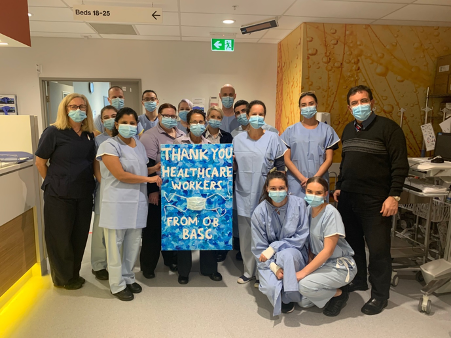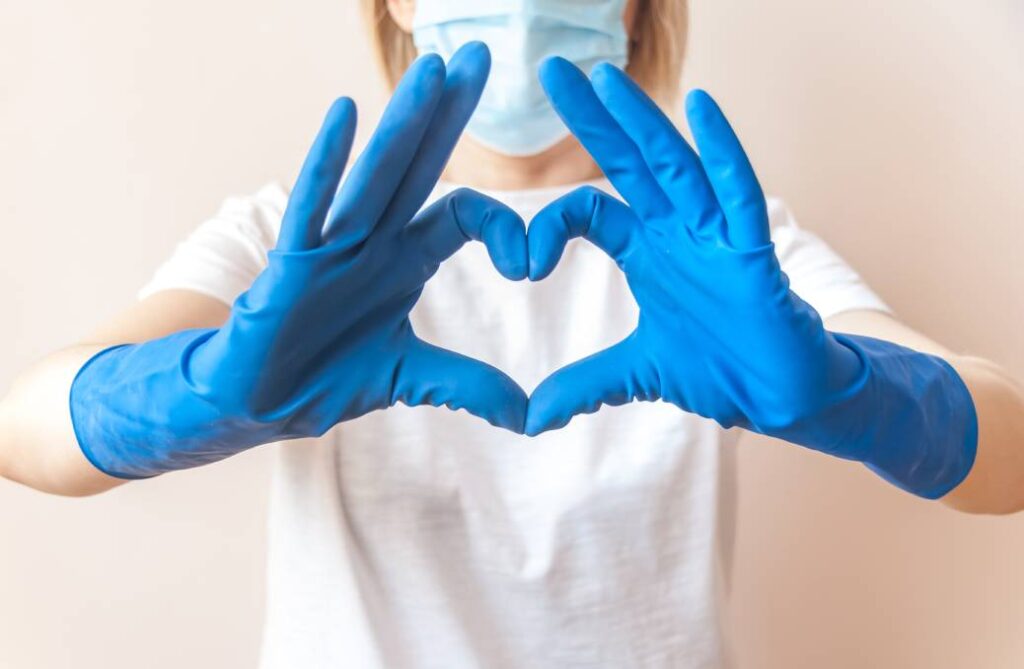As the fight against COVID-19 rages on in Australia and worldwide, we caught up with Infectious Disease Physician, Associate Professor* at the University of Wollongong, Spiros Miyakis, who answered our questions with regards to the challenges frontline workers face during this time and the role we can all play in the elimination of the spread of the virus.
- What is the role of an infectious disease physician during a pandemic?
Many roles: To look after patients who need hospital admission. To diagnose patients with the disease and differentiate from patients who have similar symptoms due to another disease (i.e flu, other respiratory or gastrointestinal infections, etc) to treat those appropriately. To advise on the hospital response and protocols during the pandemic, to offer advice to the personnel as needed, etc.
- What are some challenges you are facing during this time?
The anxiety among the healthcare workers (see recent transmissions in Victoria) and the general population alike: they need to be reassured and counselled on the real risks (versus myths spread) and be advised against complacency at the same time.
We need to keep up-to-date with the volume of new information that come to light for this –new- disease and to keep our colleagues healthcare workers informed in turn. Also maintaining personal well-being: “keep well yourself, in order to be able to look after others”. The need to keep protected from transmission, since we are at the front-line.
To keep the balance between the increased workload and some necessary personal and family time and the necessary rest (and to find time for it!). Finally, as Medical Academics, we are challenged with maintaining students teaching during pandemic, having into mind that disruption of teaching risks compromising the healthcare workforce of tomorrow!

- Victoria is going through a second deadly wave of coronavirus at the moment and new cases are being recorded across Australia. Is this going to be the new normal?
No one can be certain at this point of time. Worst case scenario that the virus will circulate on a yearly basis, in parallel with flu (something like “a second flu”) by changing slightly every year (same as flu does) or even overtake the flu, as they are competing for the same hosts (interesting how much less flu we have seen this year worldwide).
There is also the possibility that the virus is eliminated, if an effective vaccine is found to increase population immunity and at the same time the virus doesn’t have advantageous mutations (these are the genetic changes that all viruses of this kind undergo, as mentioned before).
Virus elimination is the best scenario, but there is no clear certainty at this moment that this will be eventually the case; until then we will have to live with this new reality.
- Why are some areas, even within the same country, hit so much harder than others?
It is a combination of geography and efficiency of control measures. To give you an example, Australia is a huge country, in terms of land size, therefore a pandemic in Melbourne cannot be easily spread to other States once measures are taken (i.e. borders closed) – the second wave was almost spread in NSW (due to continuous travel activity between the two neighbouring states) but once borders were closed and with intense testing and contact tracing, the spread in NSW was contained in large part.
- Can one get coronavirus more than once? Shouldn’t people be immune after they contract the virus?
As we said before, if the virus changes successfully, then you can. It is too early to tell (this is a new virus) but there is substantial possibility. Rare cases in other countries have already been described. That’s what happens with flu also.
Let’s at least hope that, if the coronavirus “came to stay”, those with subsequent infections have a milder clinical course; this is the case with many viral diseases, but it is not always the case.

- Are we close to the development of a coronavirus vaccine at all?
It looks like we are. But vaccine production is a very complex process and if one step does not work things can go backwards, so we have to “see it to believe it”. In the case of the coronavirus vaccine the clinical trials have been expedited, so the process of checking safety and efficiency (that normally takes many years) was sped up.
This, of course, does not mean a drop in quality and standards, so this is all a complex process. The big question is not if we will have a vaccine, but how effective this is going to be.
- If we have a vaccine who will be vaccinated first?
As with all vaccines, those are first tested in healthy volunteers to establish safety and efficacy. Once those two are established, vaccines will be first given to two priority groups:
1. People who are at highest risk for death and complications once they catch the virus (i.e. those with chronic underlying conditions ie heart failure, lung diseases, diabetics, immunosuppressed, elderly etc), and
2. People most at risk of contracting the virus (i.e health care workers, aged care workers, living in nursing homes, institutions, boarding houses, etc).
- Can Australia eliminate the virus in your opinion?
I think the current approach to eliminate the transmission of the virus into the community is more realistic. Eliminating the virus itself is not only in Australia’s hands, it is in the Global community’s hands. Even if we “eliminated” the virus, if this keeps circulating in other countries it can always return, unless you seal the borders.
For how long can the borders stay closed, us remaining isolated from the rest of the world? New Zealand has claimed virus elimination, but they have now again cases, even if limited.
We have to live with the new reality, the virus present, as long as we keep it under control without giving it opportunities to expand. For this is important to follow some principles:
• social distancing (1.5 metres);
• wearing masks when appropriate (closed spaces, gatherings, public transport, etc);
• paying particular attention to personal hygiene (hand sanitization, cough or sneeze etiquette, etc);
• getting tested when we are sick and self-isolating (instead of going to work or into the society) until the symptoms resolve and the results are back; and
• following the advice given by Public Health.

• Herd immunity or an effective vaccine?
The toll in deaths of herd immunity via the disease makes an effective vaccine imperative. The vaccine experts also argue that the immunity offered by a successful vaccine is more efficient than this offered by past disease; of course this can be specific to the pathogen targeted, and remains to be proven for SARS-CoV-2. I hope it is.
• How do you think we will be reminiscing COVID-19 in ten years’ time?
It might still be around, in waves and clusters. More likely –and I hope- it is eliminated, but it still gave us some opportunities, in order to prepare ourselves against another pandemic threat (no one exactly knows what that will be, but chances are that it will occur).
Lessons learnt from COVID-19 that we have to keep include among else:
• the importance of hand hygiene and personal cleanliness;
• taking advantage of the technology (for contact tracing, launching messages to the society, etc);
• showing flexibility in working conditions (i.e. working from home when possible, video-linking into meetings and avoid unnecessary travel time);
• co-ordinating efforts at Country level globally with appropriate leadership;
• emphasizing the importance of vaccinations; and
• paying attention to (and trust) the enormously important work of Public Health and Infection Prevention and Control practitioners.
*Spiros Miyakis is Associate Professor and Director of Teaching Hospitals, School of Medicine, University of Wollongong and Co-Director Division of Medicine and Head of Infectious Diseases and of General Medicine, Illawarra Shoalhaven Local Health District.

